Spring’19 CS/SE Graduates Celebrate their Success with Friends and Family at the CS Graduation Luncheon
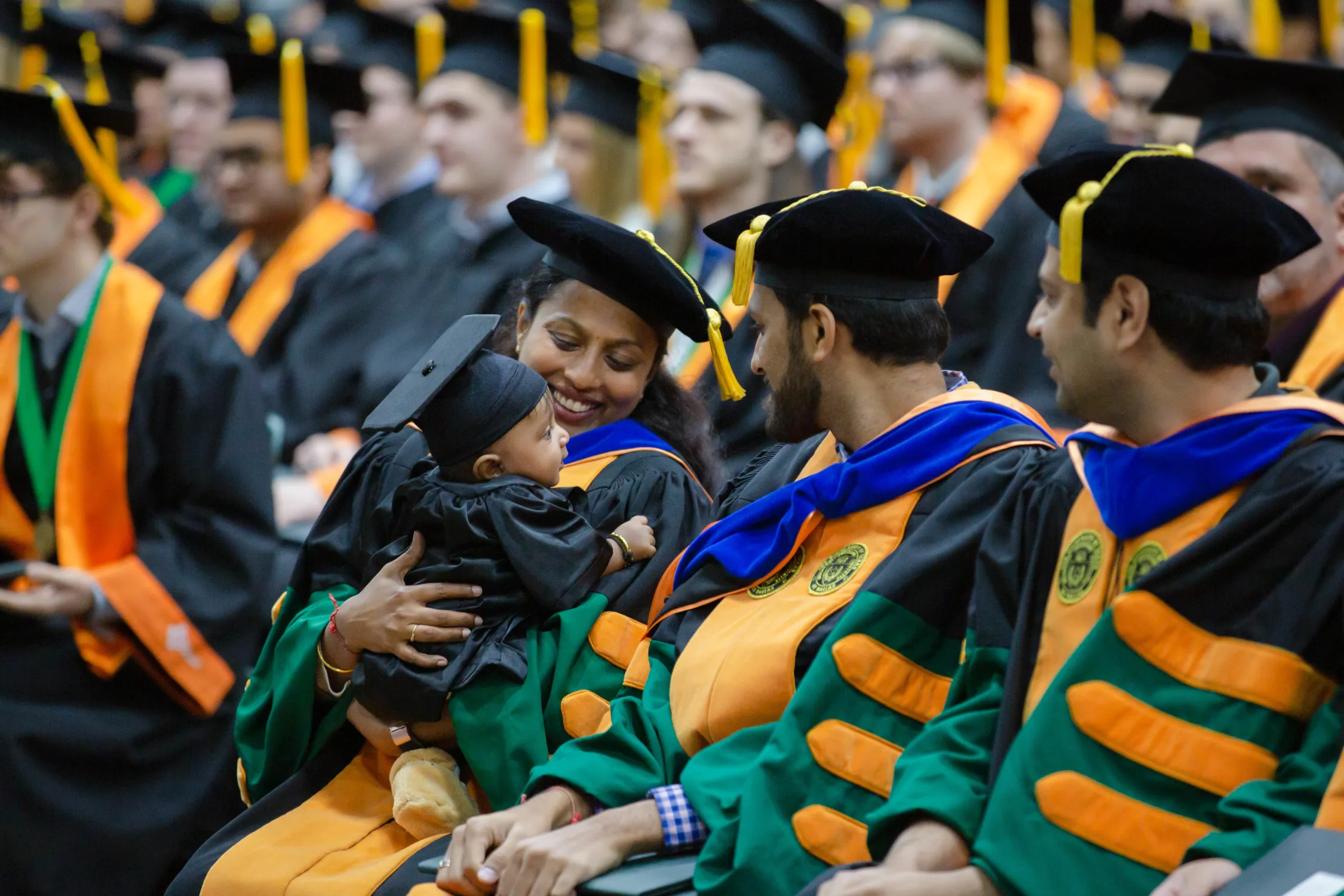
The CS Graduation Luncheon is a biannual tradition that honors the University’s newest CS/SE alumni and provides the new graduates with the opportunity to reflect on their time at UT Dallas and celebrate their success. The CS Department graduated nearly 300 undergraduate students and 200 graduate students this spring. This has resulted in the total number of graduates in the 2018-19 academic year reaching nearly 1,000, a record for the CS Department.
The graduation luncheon also served as an occasion to recognize top performing graduate and undergraduate students. The Kurt Holmes prize was given to the top performing undergraduate student Courtney Erbes. The Doctor Family prize was given to the top performing graduate student Mavis Francia. Undergraduate and graduate students who were recognized for their extraordinary academic achievement included the following:
| Graduate Students | Undergraduate Students |
|---|---|
| Neethu Antony | Courtney Erbes |
| Mavis Francia | Patrick Grady |
| Abhijit Jinendrappa | Monica Neivandt |
| Abhijeet Singh | Carla Vazquez |
| Xiaojing Zhang | Ashini Wijesundera |
| Erick Skorupa Parolin | Alexander Wong |
| Xinyi Li | Akshay Chitale |
| Sneha Hulivan Girisha | Nicolette Elaine Railsback |
| Harsh Baldevbhai Bhakt | John Thacker |
| Ashish Kumar | Marie Standeven |
| Akhila Perabe | Hrishikesh Inamdar |
| Priyadarshini Vasudevan | Rhiannon Jones |
| Ravikiran Kolanpaka | Abel Sen |
| Hui Lin | Smit Shah |
The luncheon also featured an inspiring talk by Steve Guengerich, Executive Director of the Institute for Innovation and Entrepreneurship at UT Dallas. Mr. Guengerich shared words of wisdom borne out of a successful career as a technical entrepreneur. He began by welcoming the upcoming graduate class to the exclusive network of those who have proceeded them, and by describing that network as comprising “the smartest, most talented, most ambitious, most creative, hard-working people,” they would ever know! And, as new members of the exclusive club of UT Dallas graduates, they would benefit from one of the privileges that come with this membership: access to the Institute for Innovation and Entrepreneurship. This would include life-long access to an on-campus co-working space, called the Blackstone LaunchPad, as well as access to funds up to $25,000 from the UT Dallas Seed Fund for seed money to fund start-ups.
Steve Guengerich went on to observe how we live in a fast-changing world where technological advances can be like miracles nearly beyond imagination. He pointed to fiber-optic cables, made up of 100 strands of glass, each capable of carrying 10 million telephone calls, which together can simultaneously carry 1 billion telephone calls. That would be the equivalent of one of every eight people on Earth talking on the phone at the same time! He also described how every second, network providers such as AT&T, are performing hundreds of checks on every byte of data that they handle on their global networks. They estimate that they manage 80 petabytes – a billion megabytes – every day! To put this into perspective, that amount of data would be the equivalent of all the books, all the audio recordings, all of the movies, and all of the photographs ever taken. And this is only the beginning of an evolution that is sure to continue apace into the future. Steve Guengerich points out that “In the new model, companies like Amazon, Airbnb, and dozens of others are able to create enormous value and scale, in the middle — between the supplier of the product or service, and the customer who wants to use it.” Interactive video games, such as Fortnite by Epic Games, can evolve incredibly quickly. In little over one month, Fortnite accumulated more than 250 million registered users. That amounts to two thirds the size of the US population. Disruptive technologies can be observed everywhere, including our “at home” lives. Examples include hamburgers that are 100% meat-free, the sequence of our genomes for $1,000 where that used to cost $10 million barely more than a decade ago, and modes of transportation that didn’t even exist a decade ago.
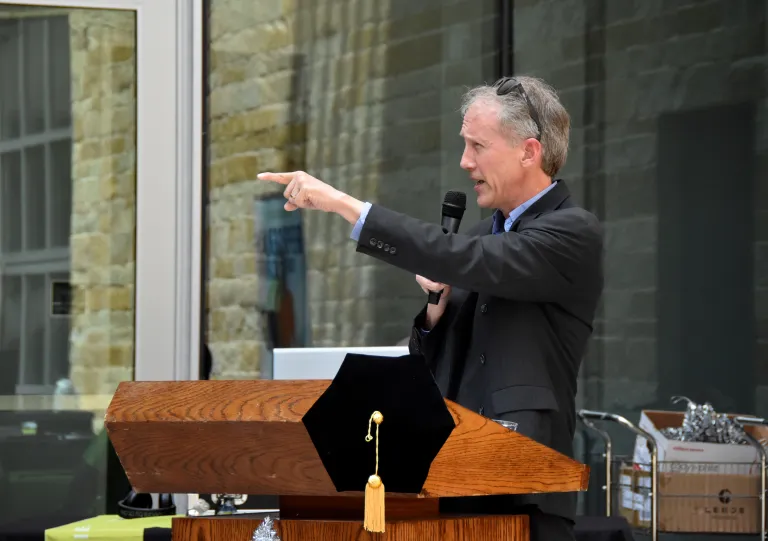
A question that all new graduates must come to grips with is how to find and keep their centers. Steve Guengerich suggests a short set of three core values that have served him well:
- Family first – family can be defined as parents, siblings, grandparents, and other extended family members. He argues that “if the family of the person who works for you isn’t right, then nothing else is going to go well. Family concerns come before all else. They affect everything else. The value of family-first works in ever-enlarging concentric circles. The next is your immediate work family. Then your other community families – church and volunteer groups you are part of, athletic and social groups you participate in, and beyond. And, just like in every nuclear family, you watch each other’s back, you celebrate each other’s success, and you speak honestly with each other when your family members – whether they are your brother, co-worker, team member, or other – aren’t doing their part to help the family succeed.”
- Hustle – hustle is about speed and never giving up. If one approach doesn’t work, try another, and another, and another! “Hustle is about doing things with a smile. About delivering more than what was asked.”
- Level-up – “leveling up is about you and your team performing above the average that others around you are doing. Whatever is the norm, take it to the next level.”
Steve Guengerich wrapped up his inspiring presentation by wishing all the new graduates the blessing of success, happiness, and peace, as they set forth on their journeys.
CS graduation luncheon was held during UT Dallas’ commencement week. The formal commencement ceremonies began Monday, May 13th, with Honors Convocation and the Doctoral Hooding Ceremony. Honors Convocation recognizes undergraduate students earning Latin honors, major honors or Collegium V honors. During this ceremony, faculty members and students dress in traditional academic regalia, with family members and friends in attendance. As each comes to the stage, the student’s advisor places the doctoral hood over the head of the graduate, signifying his or her successful completion of the doctoral program.
UT Dallas is expected to award more undergraduate degrees this spring than ever before, with 2,528 bachelor’s, 1,878 masters and 92 doctoral students earning degrees. More than 3,900 students are expected to participate in the various commencement ceremonies.
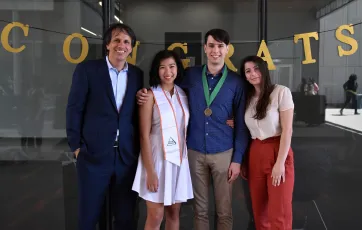
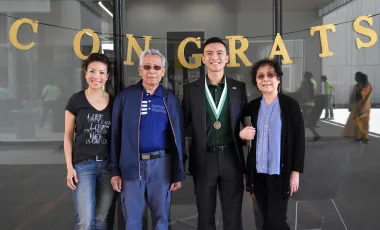
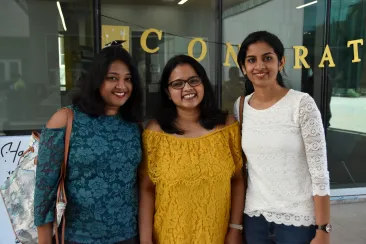
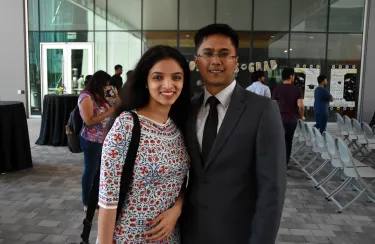
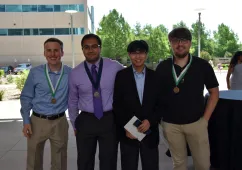
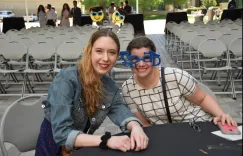
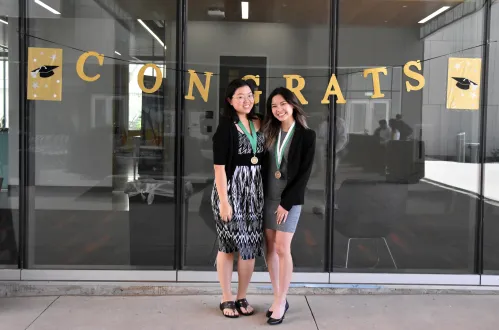
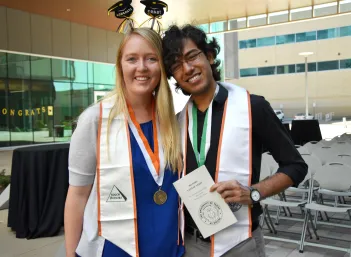
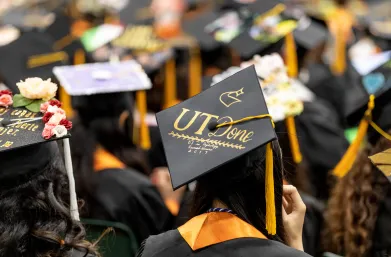
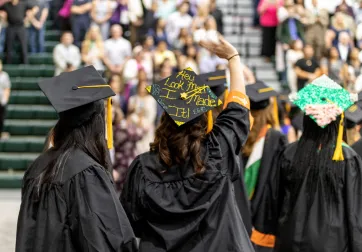
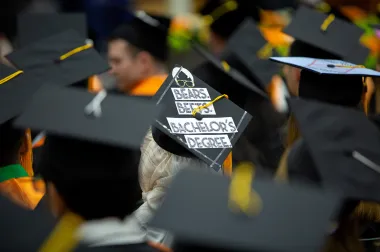
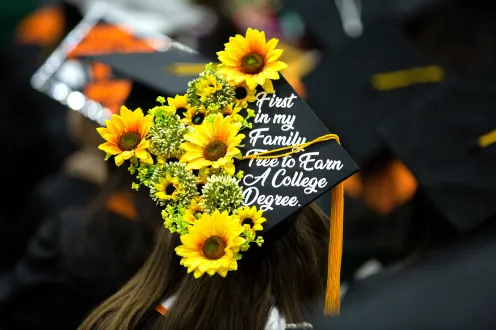
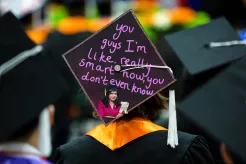
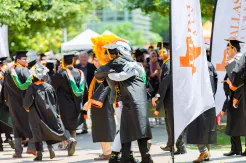
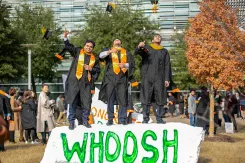
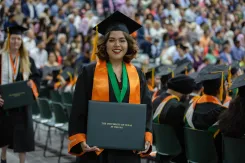
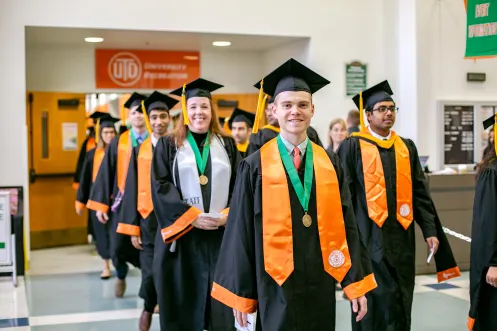
Click here to view all the photos from the Spring’19 CS Graduation Luncheon
ABOUT THE UT DALLAS COMPUTER SCIENCE DEPARTMENT
The UT Dallas Computer Science program is one of the largest Computer Science departments in the United States with over 2,800 bachelors-degree students, more than 1,000 master’s students, 190 Ph.D. students, 52 tenure-track faculty members, and 41 full-time senior lecturers, as of Fall 2018. With The University of Texas at Dallas’ unique history of starting as a graduate institution first, the CS Department is built on a legacy of valuing innovative research and providing advanced training for software engineers and computer scientists.




